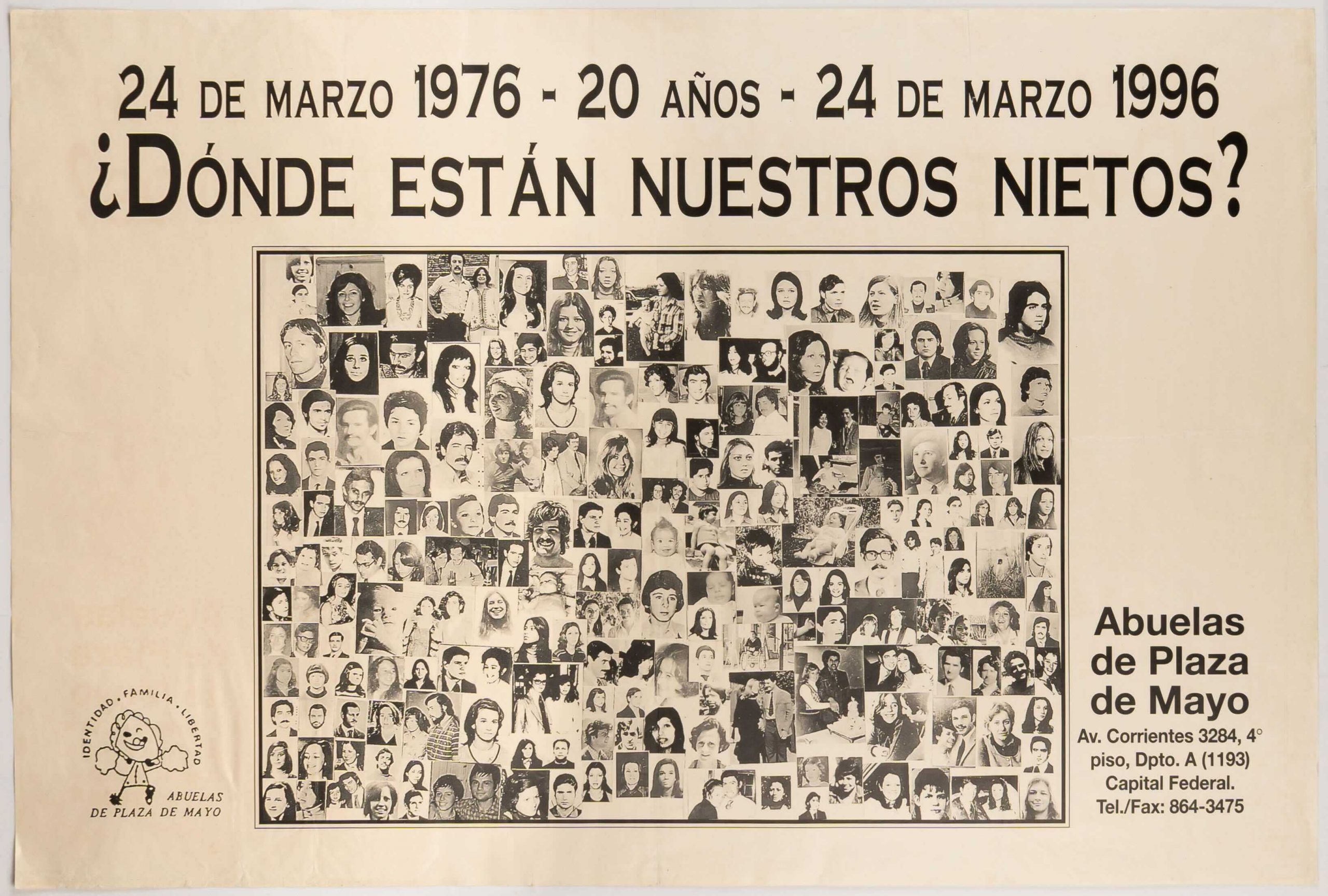Have further questions?
About the Project
This project follows a successful Planning Grant that identified, organized, and catalogued collections of regional offices of Abuelas de Plaza de Mayo. The Abuelas de Plaza de Mayo remains an active organization with over forty years of work advocating and searching for the kidnapped children during the last military dictatorship in Argentina. Digitization will focus on collections of graphic and audiovisual materials of Abuelas de Plaza de Mayo, currently at risk and in danger of deterioration. In particular, this work will digitize and create access to the VHS video collection and the poster collection.
Project Leads
- Daniela Drucaroff, Archivo Biografico Familiar
- Matteo Maiorana, Abuelas de Plaza de Mayo
Host Institution
More Information
Planning Grant: Preserving regional archives of Abuelas de Plaza de Mayo
The project "Valuation, restoration and digitization of the local archives of the Grandmothers of Plaza de Mayo: a first step towards their accessibility" was initially proposed in 2019 with the aim of carrying out a survey and creating metadata on the documentation produced by the Association Grandmothers of Plaza de Mayo at its headquarters and its subsidiaries, throughout its more than 40 years of work.
Between 2020 and 2022, in Buenos Aires and in the subsidiaries of Abuelas, work teams were formed to carry out the survey of the documentation that each headquarters houses. The teams jointly received a series of training sessions from the professional teams of the National Archive of Memory and the General Archive of the Nation. In turn, each affiliate established local consultancies, that is, links with different archives and/or local educational institutions that provided them with technical assistance to carry out the survey of their archives: the National University of La Plata, the National University of Mar del Plata , National University of Córdoba and the ISHIR-CONICET in Rosario.
The project was developed jointly among all the teams, so that each affiliate could see the survey of the other affiliates, and that the identification criteria were shared. This project allowed, for the first time, that all the subsidiaries could know what documentation is in the other headquarters; and institutionally, it allowed to briefly know the composition of the Institutional Archive of Grandmothers of Plaza de Mayo at the national level.
--
El proyecto “Valorización, restauración y digitalización de los archivos locales de Abuelas de Plaza de Mayo: un primer paso hacia su accesibilidad” fue planteado inicialmente en el año 2019 con el objetivo de realizar un relevamiento y crear metadata sobre la documentación producida por la Asociación Abuelas de Plaza de Mayo en su sede central y sus filiales, a lo largo de sus más de 40 años de labor.
Entre el 2020 y el 2022, en Buenos Aires y en las filiales de Abuelas se conformaron equipos de trabajo para llevar adelante el relevamiento de la documentación que aloja cada sede. Los equipos recibieron conjuntamente una serie de capacitaciones por parte de los equipos profesionales del Archivo Nacional de la Memoria y del Archivo General de la Nación. A su vez, cada filial estableció asesorías locales, es decir, vínculos con distintos archivos y/o instituciones educativas locales que les brindaron asistencia técnica para llevar adelante el relevamiento de sus archivos: la Universidad Nacional de La Plata, Universidad Nacional de Mar del Plata, Universidad Nacional de Córdoba y el ISHIR-CONICET en Rosario.
El proyecto se desarrolló articuladamente entre todos los equipos, de modo tal que cada filial pudiera ver el relevamiento de las otras filiales, y que los criterios de identificación fueran compartidos. Este proyecto permitió, por primera vez, que todas las filiales pudieran saber qué documentación hay en las otras sedes; e institucionalmente, permitió conocer someramente la composición del Archivo Institucional de Abuelas de Plaza de Mayo a nivel nacional.
Project Leadership
- Marcelo Pablo Castillo, Abuelas de Plaza de Mayo
- Milena Duran, Abuelas de Plaza de Mayo
Abuelas de Plaza de Mayo Collection Inventory
Understanding the Regional Office Archives
By highlighting collections outside the urban centers of the country, this project documents ongoing human rights work across Argentina.
This collection allows us to visualize and understand the particularities of the organizational processes of the struggle for human rights in Argentina, specifically of the Asociación Abuelas de Plaza de Mayo, in each locality where a branch of the organization developed. Distant but closely linked to the Association's headquarters, each of these offices had its own particular constitutive process. Their daily work up to the present day is closely related to the characteristics of their territory. At the same time, the collection allows us to understand how these localities lived and experienced the dictatorship and repression, what forms the human rights movement took in each of them, and what relationships they established internally and with other localities and countries.
The inventory includes collection details from:
- Rosario
- Mar del Plata
- La Plata
- Córdoba
- Buenos Aires
